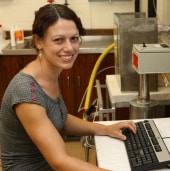
Susie Wood
Combustion of mine ventilation air methane using porous burners
I'm working on a project to develop greenhouse gas mitigation technologies for underground coal mines and landfills. At the moment, mine ventilation air containing methane is just released into the air. We're developing an advanced combustion system capable of burning diluted fuels like methane, so that we can make use of a fuel that would otherwise be wasted.